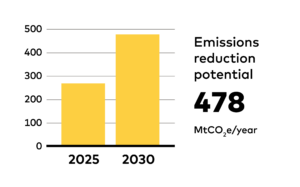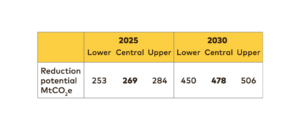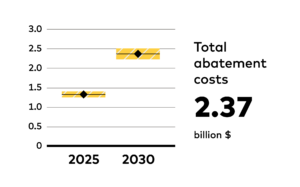Climate impact
Denmark has reduced nitrous oxide (N2O) emissions from agriculture by almost 30% between 1990 and 2014. As the agricultural area decreased by approximately only 4% during the same time, we see an emission efficiency improvement of 28%.
Similar measures to cut N2O emissions can also be taken in other countries. Scaling up the solution would reduce emissions by 478 Mt in 2030, converted into CO2 equivalents.


Success factors
N2O emissions in Denmark have declined over time due to strict regulations on fertiliser and manure management. The main driver has been the EU Nitrate Directive protecting water from nutrient runoff.
One part of the solution is to control how and when manure spreading is allowed. In Denmark animal manure must be tilled into the soil within six hours. It is not allowed for the fertiliser to spread into drains and streams. Application onto black soil and permanent grass must be done by injection or pretreated slurry. The manure used may not exceed the amount from 2.3 livestock units per hectare.
The second part of requirements is on storage and use. Slurry containers cannot be located less than 100 metres from the nearest stream or lake, they must be made of durable materials and need to be covered. Finally, various crops have nitrogen standards on how much fertiliser can be applied.
“Denmark has improved the N2O emission efficiency of agriculture by almost 30%.”
Costs
The abatement cost for similar measures in Iceland has been estimated at 5 $/tCO2e. The total cost of implementing the solution would then be $1.33 billion in 2025 and $2.37 billion in 2030.

Co-benefits
The main driver for manure management are co-benefits, especially reducing water pollution.
Barriers and drivers
This solution is policy-driven, as seen in Denmark. Scaling it up to other countries would require stringent requirements, in particular those regarding water quality. Substantial policy interventions into farming practices may be politically difficult in some countries.
Monitoring compliance at farms may not be possible in many cases. Particularly poorer countries might need support to build their capacity to execute and follow the regulations.






RELATED SOLUTIONS